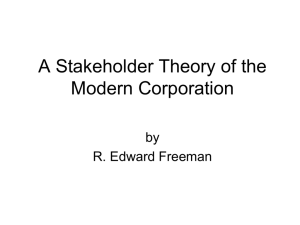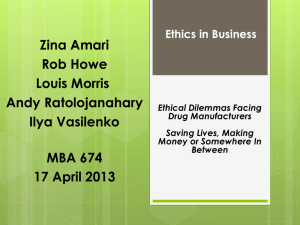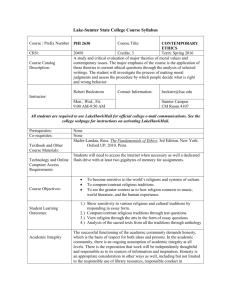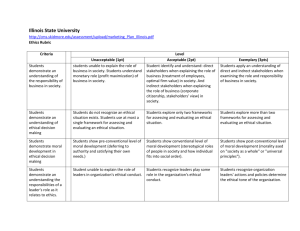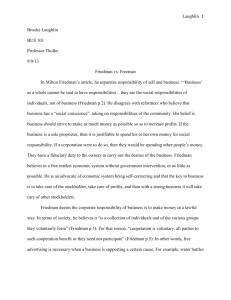study_guide - Homework Market
advertisement
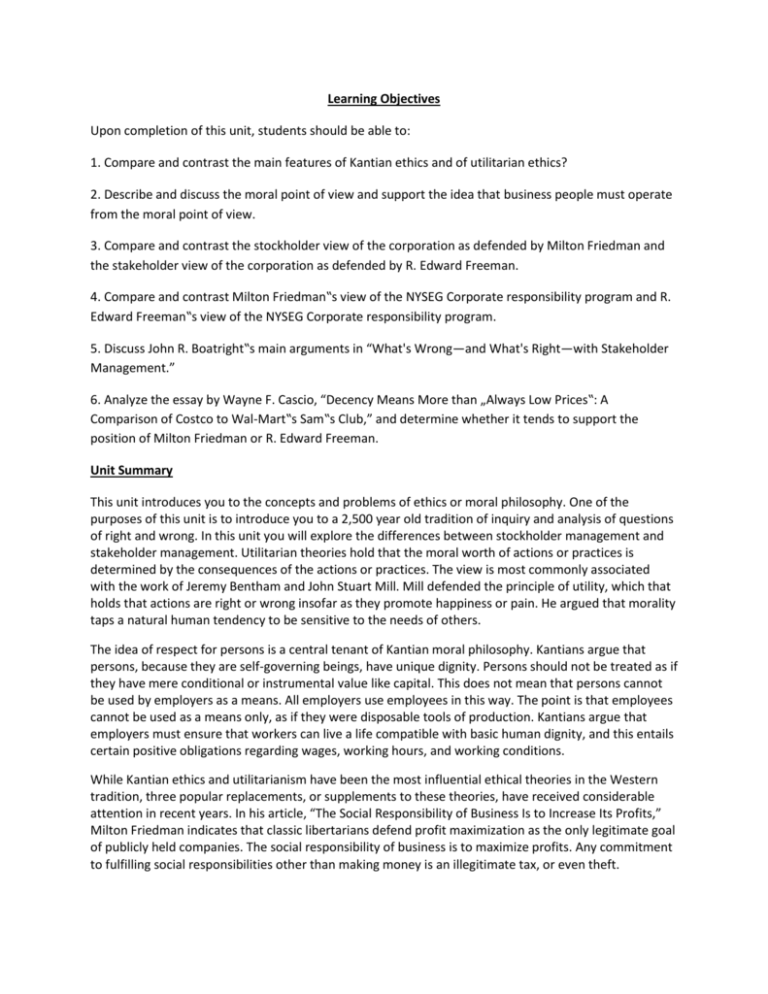
Learning Objectives Upon completion of this unit, students should be able to: 1. Compare and contrast the main features of Kantian ethics and of utilitarian ethics? 2. Describe and discuss the moral point of view and support the idea that business people must operate from the moral point of view. 3. Compare and contrast the stockholder view of the corporation as defended by Milton Friedman and the stakeholder view of the corporation as defended by R. Edward Freeman. 4. Compare and contrast Milton Friedman‟s view of the NYSEG Corporate responsibility program and R. Edward Freeman‟s view of the NYSEG Corporate responsibility program. 5. Discuss John R. Boatright‟s main arguments in “What's Wrong—and What's Right—with Stakeholder Management.” 6. Analyze the essay by Wayne F. Cascio, “Decency Means More than „Always Low Prices‟: A Comparison of Costco to Wal-Mart‟s Sam‟s Club,” and determine whether it tends to support the position of Milton Friedman or R. Edward Freeman. Unit Summary This unit introduces you to the concepts and problems of ethics or moral philosophy. One of the purposes of this unit is to introduce you to a 2,500 year old tradition of inquiry and analysis of questions of right and wrong. In this unit you will explore the differences between stockholder management and stakeholder management. Utilitarian theories hold that the moral worth of actions or practices is determined by the consequences of the actions or practices. The view is most commonly associated with the work of Jeremy Bentham and John Stuart Mill. Mill defended the principle of utility, which that holds that actions are right or wrong insofar as they promote happiness or pain. He argued that morality taps a natural human tendency to be sensitive to the needs of others. The idea of respect for persons is a central tenant of Kantian moral philosophy. Kantians argue that persons, because they are self-governing beings, have unique dignity. Persons should not be treated as if they have mere conditional or instrumental value like capital. This does not mean that persons cannot be used by employers as a means. All employers use employees in this way. The point is that employees cannot be used as a means only, as if they were disposable tools of production. Kantians argue that employers must ensure that workers can live a life compatible with basic human dignity, and this entails certain positive obligations regarding wages, working hours, and working conditions. While Kantian ethics and utilitarianism have been the most influential ethical theories in the Western tradition, three popular replacements, or supplements to these theories, have received considerable attention in recent years. In his article, “The Social Responsibility of Business Is to Increase Its Profits,” Milton Friedman indicates that classic libertarians defend profit maximization as the only legitimate goal of publicly held companies. The social responsibility of business is to maximize profits. Any commitment to fulfilling social responsibilities other than making money is an illegitimate tax, or even theft. Maximizing profits will produce the best overall consequences for society. As such, private businesses should do the same. In his new essay, “Managing for Stakeholders,” R. Edward Freeman defends the view that the primary job of managers and executives is to create value for all stakeholders while managing the nexus of relationships among them. Businesses should be managed so as to create value for customers, suppliers, employees, communities, and financiers. In his article, Freeman discusses the Separation Fallacy: It is useful to believe that sentences like “x is a business decision” have no ethical content or any implicit ethical point of view. Also, it is useful to believe that sentences like “x is an ethical decision” have no business content. He also discusses the Open Question Argument: If this decision is made, for whom is value created and destroyed? Who is harmed and/or benefited by this decision? Whose rights are enabled, and whose values are realized by this decision (and whose are not)? What kind of person will I (we) become if I (we) make this decision? The Integration Thesis is also discussed in Freeman‟s article: Most business decisions have some ethical content, or implicit ethical view. Most have ethical decisions, business content, or an implicit view about business. Additionally, Freeman addresses the Responsibility Principle: Most people, most of the time, want to, actually do, and should, accept responsibility for the defects of their actions on others.
